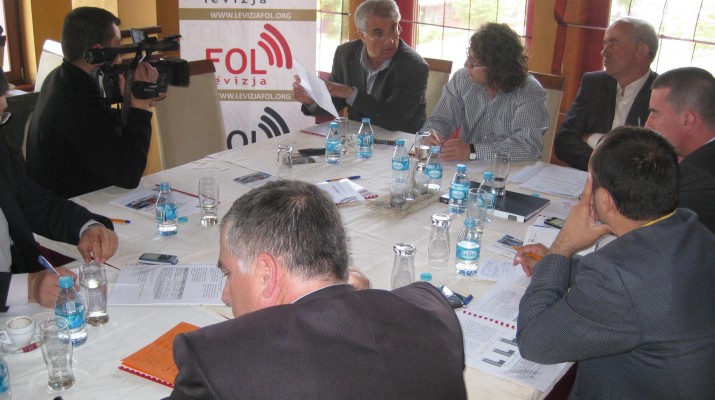Transparency of public investments in road infrastructure in Prizren
April 29, 2011 – Movement FOL has organized the next debate in Prizren on “Public Investments in Road Infrastructure: Transparency and Accountability”. Participants in this debate were municipal officials, civil society, media and citizens of this municipality.
Petrit Zogaj declared that Movement FOL has begun to implement this project based on the high level of investments in road infrastructure and the low level of transparency that has associated the realization of the projects in this sector. He added that the purpose of the discussions with the municipalities is to consider the trend of public investments in road infrastructure by central level and local in municipalities, the current situation, future plans and the level of transparency and accountability of these investments. According to him the debate in this municipality is of a particular importance considering that the largest infrastructure project Merdare-Morine highway is taking place in this municipality.
The debate continued with the Head of the Municipal Assembly of Prizren, Mr. Njiazi Kryeziu, who declared that the transparency and accountability in the municipality of Prizren is satisfactory regarding public investments realized in this municipality. According to him “, the design of the projects in this municipality is done in accordance with an eleven years tradition of local governance.” He added that “as the construction of Merdare-Morine highway is concerned, Prizren Municipality has formed a committee whose main task was informing citizens about the process of expropriation in the municipality”. He, on behalf of the Municipal Assembly and the Mayor expressed his disappointment regarding the non-involvement of the Municipality of Prizren directly in construction of Merdare-Morine highway. The process of accountability in the Municipality of Prizren, according to him, is conditioned by the nature of the governing coalition “because a party cannot take a decision itself without a consensus within the coalition, said Mr. Kryeziu.
The director of Public Services Department in the Municipality of Prizren, Mr. Hasan Hasani presented the municipal investments in road infrastructure in the Municipality of Prizren, among others he said “in 2010 were invested 6 million euros and in 2011 were planned to be invested around 7 million euro in road infrastructure projects in this municipality”. He added that all the decisions to invest in this sector were taken according to the importance and necessity of the investment in a certain area. The MTC allocated funds for two projects, to be implemented in 2010, one of them is not finished yet. He expressed disappointment regarding the central investment in this municipality, he said that “although the Municipality of Prizren is the second largest municipality by the number of inhabitants, the level of investments in road construction by the MTC has been little.”
The debate continued with Mr. Haziz Hodaj, chairman of the LDK parliamentary group in the municipality, who expressed his disappointment with the low level of transparency and accountability of the municipality regarding the investments in this sector. He said “we are not against construction of the highway, but we ask that this process be fair and transparent to the citizens of Kosovo”. He added that “in our community projects are facing delays and lots of irregularities, during the election campaign the municipality has invested in various projects disregarding tender procedures and there were no budgetary positions for these projects.”
After the presentation by officials, the discussion was opened to the participants and there were questions and answers about some projects, a special focus was paid to the expropriation process in the municipality. During this discussion there was a little change in the mood and minimalism of their concerns about the process of expropriation of their properties compared with the period when Movement FOL visited the residents of this municipality in July 2010.
This activity was supported from USAID through the Program for Strengthening Civil Society implemented by ISC – Institute for Sustainable Communities
